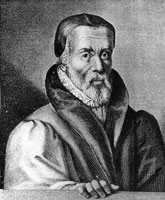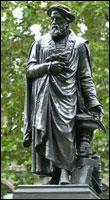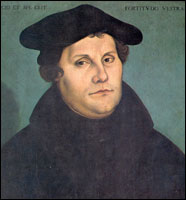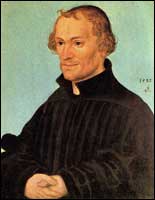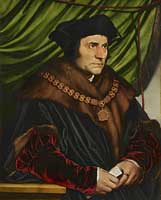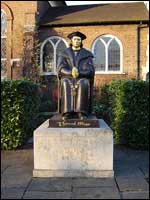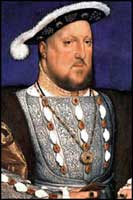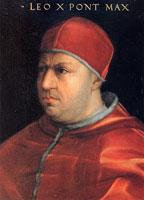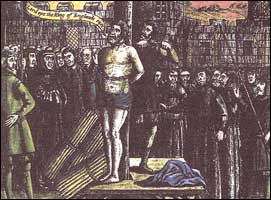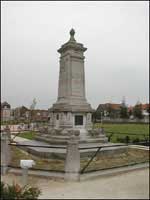Joshua the Hebrew Messiah said:
For verily I say unto you, until heaven and earth pass away, one jot (Hebrew jod, Greek iota) or one tittle shall in no wise pass from the law, until all be fulfilled (Matthew 5:18).
At the first coming of the Messiah the universal language of the world was Koine or Common Greek. Many of the letters of the Greek alphabet came from Hebrew, and most people had access to the Hebrew Scriptures through the marvelous translation called the Septuagint.
Hebrew–the first and oldest language in the world–was the lingua franca of the Roman occupied nation of Israel, and many people in Israel were trilingual as they spoke Hebrew, Greek, and Latin.
St. Paul used the Septuagint when he planted Christianity in Britain, and a few years later the Old Latin or Itala became the dominant version. This was the translation that St. Patrick the Briton brought to Ireland.
English is not the original language of Britain. English is a Gothic language which was brought to Britain with the Anglo-Saxon invasions of the 5th century.
No copies of the Scriptures exist in the original language of the Britons. No history of Christianity in Britain from the time of St. Paul to Constantine exist. The struggle of Christianity with the Druids must have been as intense as during the Reformation period but nothing of that history has survived . . . except in the Secret Archives of the Vatican.
By 1066, all copies of the original Septuagint and Old Latin versions were destroyed by the Vikings and the Latin Church monks. The first man to translate from Hebrew to English was Saint William Tyndale.
|
Saint William translated the Greek presbuteros as elder and ekklesia as CONGREGATION when it referred to a Christian assembly.
He was pursued relentlessly by Sir Thomas More, and he finally died as a Christian martyr in Belgium.
Around 1523, Saint William Tyndale first disclosed his plans to follow the example of Saint Martin Luther in Germany and translate the Bible into the language of the common people:
It was not long after, but Master Tyndale happened to be in the company of a certain divine, recounted for a learned man, and, in communing and disputing with him, he drave him to that issue, that the said great doctor burst out into these blasphemous words, and said, “We were better to be without God’s laws than the pope’s,” Master Tyndale, hearing this, full of godly zeal, and not bearing that blasphemous saying, replied again, and said, “I defy the pope, and all his laws,” and further added, "that if God spared him life, ere many years he would cause a boy that driveth the plough, to know more of the Scripture than he did." (Foxe, Acts & Monuments, vol. 5, p. 207).
That remark got him in BIG trouble with the hierarchy and he found no safe place in England to do his translating work.
Saint William Tyndale was a graduate of Cambridge University but neither Cambridge nor Oxford offered courses in Hebrew at that time.
In 1524, Tyndale left his homeland for the last time and headed straight for Wittenberg, Germany....Saint Martin Luther was already famous or infamous in England for his Latin tome The Babylonian Captivity of the Church.
|
The humble Reformer greatly deprecated his knowledge of Hebrew when he said:
If I were younger I would want to learn this language [i.e. Hebrew], for without it one can never properly understand the Holy Scripture….For that reason they have said correctly: "The Jews drink out of the original spring, The Greeks drink out of the stream flowing out of the stream, The Latins, however, out of the puddle." (Luther, Table Talk, p. 531).
Unfortunately, at the time of the Reformation, no copies of the original Septuagint existed in Germany, and the only Hebrew text available was the altered text of the Masoretes, with Adonai substituted for JEHOVAH.
As he was translating the Old Covenant into English, Saint William noticed the great similarity between the 2 languages:
For the Greek tongue agreeth more with the English than with the Latin. And the properties of the Hebrew tongue agreeth a thousand times more with the English than with the Latin. The manner of speaking is both one, so that in a thousand places thou needest not but to translate it into the English word for word when thou must seek a compass in the Latin, and yet shalt have much work to translate it well favouredly, so that it have the same grace and sweetness, sense and pure understanding with it in the Latin, as it hath in the Hebrew. A thousand parts better may it be translated into the English than into the Latin. (The Obedience of a Christian Man, p. 19).
This fact should not be surprising because Hebrew was the original language of the world before the confusion of tongues at the Tower of Babel.
Sir Thomas More was a bitter foe of the Bible in English!!
Sir Thomas More was a deadly Druid and bitter foe of the Bible in English. He wrote over a million words in condemnation of Tyndale's English translation.
At that time, the Latin Church owned over 1/3 of the land, and its vast income was in grave jeopardy by the entrance of the Bible in English.
Sir Thomas More was determined that no copies of the Scriptures would ever reach the English shores. When his spies told him that Tyndale was studying and translating at Wittenberg University under Martin Luther, his fury knew no bounds.
|
More was the ghostwriter for King Henry's Latin tome Defence of the Seven Sacraments, which More wrote in refutation of Saint Martin Luther's Babylonian Captivity of the Church.
Henry left the running of the country to the all powerful Cardinal Wolsey . . . but still he had no time to write books . . . because he was proccupied with sports, jousting, martial arts, and producing a male heir to the throne.
As the supposed author of the book, Pope Leo X awarded Henry the title: Defender of the Faith (Fidei Defensor).
|
As the supposed author, Pope Leo awarded Henry the Latin title Fidei Defensor (Defender of the Faith)....This was the same Pope who called the printing press "the work of the devil."
This pompous title of defender of the Papacy is hereditary and appears on English and Canadian coins to this very day. British monarchs still take their role as defenders of the Papacy very seriously.
More put a million dollar contract on Saint William Tyndale and the translator spent most of his time on the run. Eventually, he was betrayed and imprisoned in Belgium. The monks spared no effort to recover him for the Latin Church . . . but all in vain.
|
On the morning of October 6, 1536, Saint William Tyndale was burned at the stake near the town of Vilvoorde, near Brussels, Belgium. Before he was strangled and burned he prayed"Lord open the eyes of the king of England."
That prayer was answered in a marvelous way when King Henry allowed the reading of the Bible in English and suppressed all the corrupt monasteries!!
Saint William Tyndale said that God's Name was JEHOVAH
For a thousand years in western Europe, the Latin Vulgate held sway, and its influence was enormous. Saint William Tyndale rejected many of its words like church, charity, penance, priest etc., etc., but he could not quite throw off its influence completely. He retained the name Jesus for the Messiah, and whenever he saw the word JEHOVAH in Hebrew he translated it as LORD:
Jehovah is God's name, neither is any creature so called. And is as much to say as one that is of himself, and dependeth of nothing. Moreover as oft as thou seest LORD in great letters (except there be any error in the printing) it is in Hebrew Jehovah, thou that art or he that is. (Tyndale's Old Testament, p. 82).
Hebrew was the first language in the world—the language of Adam and Eve, Noah, Shem and Abraham. It was a perfect language with 22 consonants and at least 5 vowels. No language is perfect without vowels connecting the letters.
Here are the 22 consonants of the Hebrew alphabet taken from Psalm 119:
Jod |
Teth |
Cheth | Zain |
Vav |
Heh
|
Daleth |
Gimel |
Beth |
Alef |
Resh |
Koph |
Tzaddi |
Pe |
Ain |
Samech |
Nun |
Mem |
Lamed |
Caph |
 |
|||||||||
Tav |
Schin |
The Hebrew letter Ain looks like a Y but it is equivalent to the English O. The Hebrew letter Tzaddi looks like a Y but it also has nothing in common with the English letter Y.
JEHOVAH is spelled with 4 consonants: Jod ... Heh ... Vau ... Heh . . . and 3 vowels e ... o ... a.
In the "Hebrew" of today, the letter JOD is vowel pointed to show if it is a J as in Joshua . . . or an I as in Israel.
No Hebrew equivalent to the English letter Y
There is no Hebrew equivalent to the English letter Y. The Messiah is the King of the JEWS. . . not the King of the Yiddish YHUDIM!!
The Hebrew JOD is the equivalent of the Greek letter I, as in Ionian, and it is also the equivalent of the Latin I, as in IUPITER (JUPITER).
The sound of the Hebrew letter Jod came into English as the letter I used as a consonant and having the soft 'g' sound like today's letter 'j.'
From the Hebrew and Greek letter I we get the French, Spanish and English letters I and J.
The state of Yisrael (Medinat Yisrael) with its Yhudim capital at Yerushaláyim; and the names Yeshua and Yahweh are just fictional names created by the Yiddish Khazars.
Joshua the Messiah promised that not one JOT or tittle would pass from the Law of Moses until all would be fulfilled. He was referring to the Hebrew letter JOD . . . which is the smallest of the letters in the Hebrew alphabet:
For verily I say unto you, until heaven and earth pass away, one jot (Hebrew jod, Greek iota) or one tittle shall in no wise pass from the law, until all be fulfilled. (Matthew 5:18).
The last warning in the Bible was directed against Pope Damasus and Jerome, or anyone who changes the w-o-r-d-s of Holy Scripture:
For I testify unto every man that heareth the words of the prophecy of this book, If any man shall add unto these things, God shall add unto him the plagues that are written in this book: And if any man shall take away from the words of the book of this prophecy, God shall take away his part out of the book of life, and out of the holy city, and from the things which are written in this book. (Revelation 22:18-19).
References
Daniell, David, Tyndale's Old Testament. Yale University Press, New Haven & London, 1992.
Foxe, John. Acts and Monuments. 8 volumes, reprinted by AMS Press, New York, 1965.
Luther, Martin. Table Talk. William Du-gard, London, 1652.
Henry VIII. Assertio Septem Sacramentorum, or the Defence of the Seven Sacraments. Benziger Brothers, New York, 1908. (First published in 1521).
Luther, Martin. Martinus Lutherus contra Henricum Regem Anglie or Martin Luther Against Henry, King of England. Benziger Brothers, New York, 1908. (First published in 1522).
Mozeson, Isaac E. The Word: The Dictionary that Reveals the Hebrew Source of English. Shapolsky Publishers, New York, 1989.
Tyndale, William. The Obedience of a Christian Man. Penguin Books, London, England, 2000, First published in 1528.
Copyright © 2016 by Patrick Scrivener
